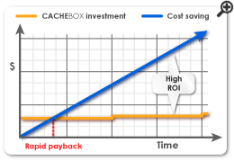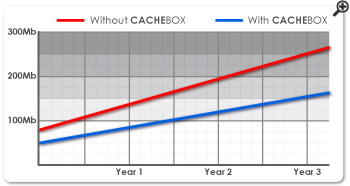Investment in a cache is usually easy to justify:
- Where bandwidth saving is a key driver and extra bandwidth is moderately expensive or worse, a quick calculation demonstrates the benefit in simple cash terms. Rapid payback often makes it a no-brainer.
- If user experience is the issue rather than bandwidth per se, then calculating the benefits in money terms is more complicated, but a compelling case based on other measures is often obvious.
Bandwidth savings
Bandwidth savings translate directly into financial benefits as they allow you to a) use less bandwidth on a metered connection, b) delay bandwidth upgrades or c) fit more users onto existing connections.
In each case, to calculate savings you’d need to estimate the Hit Rate – the amount of your traffic that you could expect to cache. Typical planning assumptions might be:
- Service provider with significant video traffic – 35%
- Service provider with little video traffic – 25%
- Education – 35%
- Enterprise – 30%
Example calculations for each type of Return on Investment are as follows:

With metered bandwidth, the calculation is very simple.
Say you use 10Gb per month at a cost of $500 per Gb, so your monthly cost is $5000.
You estimate that 30% of your content is cacheable so:
Savings = $5000 x (30/100) = $1500 per month.
With CACHEBOX, you’d see payback in just a few months and save $18,000 per year thereafter.
Using a cache lets you delay an upgrade to your bandwidth as your traffic grows.
Say you have a 100Mb connection with average peak load of 80% (80Mb) and growth of 60Mb per year. You would run out of bandwidth in 4 months:
60Mb / 12 = 5Mb monthly growth => 4 months to fill the spare 20Mb
 A cache saving of 35% would bring your current peak load down to 52Mb and your growth rate to 39Mb per year. This would keep you under your limit for 15months – an 11 month delay:
A cache saving of 35% would bring your current peak load down to 52Mb and your growth rate to 39Mb per year. This would keep you under your limit for 15months – an 11 month delay:
- Year one: 52Mb + 39Mb = 91Mb
- Year two: 91Mb + 39Mb = 130Mb (capacity reached after 3 months)
If your current cost were $1000 per month and after upgrade it would be $1500, your saving before upgrade would be:
11 (upgrade delay in months) x $500 (cost difference) = $5,500 cost saving
After you upgrade, caching continues working to save you bandwidth and delay future upgrades. You continue to save money month after month.
It’s not all about cash savings, caching can help you to grow revenue too. Taking an ISP as an example, if you have 1500 customers each spending an average $25 per month and you expect your hit rate to be 35%, your current monthly income is $37,500 and caching could help you make an additional $13,125.
1500 x $25 = $37,500 current income
$37,500 x (35/100) = $13,125 additional monthly income
That’s over $150,000 per year, dozens of times higher than the cost of an average CACHEBOX.
Better user experience
When user experience is the key driver, there will often be metrics which establish compelling reasons for investment:
- In a school, you’ll see less wasted lesson time, giving teachers the confidence to use online learning resources in the classroom. So you’ll spend less time dealing with bandwidth related support issues, improve your user satisfaction rate and gain the bandwidth to support 1:1 (student:computer) schemes.
- For ISPs, in addition to bandwidth savings, you can typically provide a speed increase for customers of around 20-50%. An increase of this magnitude leads to increased customer satisfaction, reduced churn-rate, lower marketing costs and an opportunity to increase Average Revenue Per User (ARPU).
- In an enterprise, with drastically increased download speeds you’ll see enhanced employee productivity, spend less time dealing with bandwidth related support issues and improve your user satisfaction rate.
Next: Why CACHEBOX >


